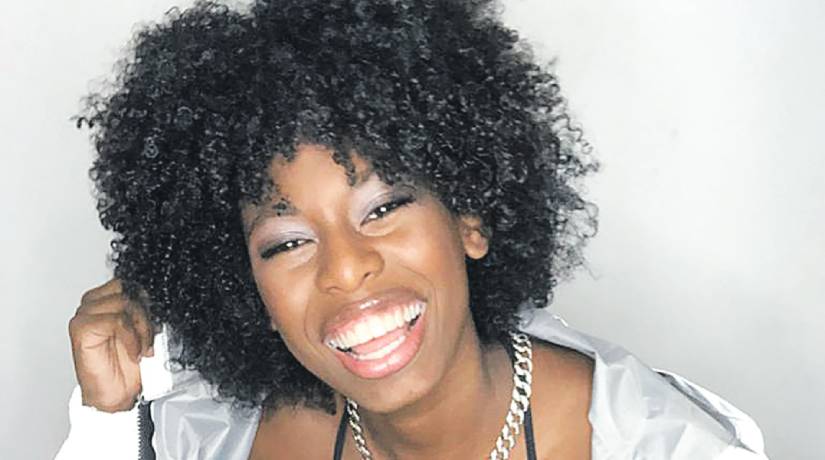In English
28 de julho de 2020
Art Against Racism – Level 3
Article published on Joca 153

Ever since she was a child, 16-year-old MC Soffia has found a way to stand up against racism and inspire other black girls through music. “When I was growing up, there were no black girls singing (to me) ‘little black girl, you are not cute, you are a queen’. I wrote this song so other girls could pass this message on,” explains the activist, singer, and composer.
In an interview with 14-year-old reader Eyshila S., MC Soffia talked about her inspiration and commented on the anti-racism protests around the world. Check out their conversation:
What is it like being a black woman and being in the art scene as an MC, and often not being well-received by society?
I think my experience is similar to that of all other black women in other professions, because all black women suffer. It is a huge struggle. I believe that even though I am working a lot, society does not know me yet, and I do not reach all the places I should reach with my songs because I am black.
Where does your inspiration and courage to talk about racism come from?
It often comes from society, from everything I see, and everything that happens. From black girls who do not accept themselves, for example, who go to school and cannot let their hair down because they know they will be made fun of. I would also go to school with my hair up and was afraid to let it down. The fact that I tell a girl that she is pretty and that she can get as far as she wants to with a bit of a fight, will make her believe in herself.
Your styles are rap and funk, which were based on black people’s problems, but nowadays these styles have been appropriated by white people. How do you react to this?
Many rhythms like rap, jazz, funk, axé, and rock were created by black culture. Most people think that the majority of rock artists are white, but it is not so. I think it is important to say that everything that is done by black people is treated as criminal, because there is prejudice against Afro-Brazilian culture. Black artists started musical cultures that were made invisible and are not talked about anywhere. But when a non-black person comes in, it seems like it becomes more acceptable. This is covert racism: people only begin to accept things when white people are involved.
How do you feel in regards to young blacks who do not take a stand against racism?
I think that if a black person wants to, they can stand up to it. But if they do not want to, they are their own statement, because they are black. But if they don’t talk about racism, but know that they want to be a doctor, they can. If they want to be an actress or a fire fighter, for example, they can also be that, but that would already be a protest. A black girl who accepts her hair inspires other girls without having to speak out through media, and that is already a fight.
About the protests: how are you participating in this fight?
These protests have always existed, in the USA as well as in Brazil. I have always gone to demonstrations, ever since I was small. Even if we’ve been fighting for years, we have achieved certain things that are very important for us, with a lot of effort. I think that the way I express myself is through music and art. The current protests are more visible because we are a part of the internet generation, so we record, show, and people start to look at #vidasnegrasimportam (#blacklivesmatter), which I think is very important.
In your opinion, why don’t we have protests in Brazil like there are in the US, since many black people here also die because of police brutality?
The US and Brazil are different societies, and racism is also different in both places. There (in the US), whites did not like blacks and would just tell them in their face that they could not get on the bus or study in their white people’s schools. So, blacks started to create their own schools for example. Here in Brazil, because it is covert, there are people who still do not believe that racism exists. Even if Brazil also kills blacks, the issue is not just the killing, but also that black girls cannot accept themselves. There is strong racism against us also.
What advice would you give black girls in their fight against racism?That they keep fighting, because we are all in this together. Our ancestors fought a lot so we could speak up. We are featured in a few places now, but we are already accomplishing quite a lot. Also, inspire other girls, start accepting yourselves with your hair and your colour and think of yourselves as wonderful. And learn about your origins, because the best fight against racism is acceptance and knowledge.
Questions
1) According to Soffia, what is covert racism?
a) People can only accept things when whites are involved.
b) White people saying they do not like black people
c) Blacks having to create their own schools
d) Racist attitudes that are started by black people
2) What do you do in your day-to-day that contributes towards anti-racist behaviour?
Ixi! Você bateu no paywall!
Ainda não é assinante? Assine agora e tenha acesso ilimitado ao conteúdo do Joca.












Você precisa fazer o login para publicar um comentário.